中考英语语法大全:句型转换
- 格式:doc
- 大小:116.50 KB
- 文档页数:20
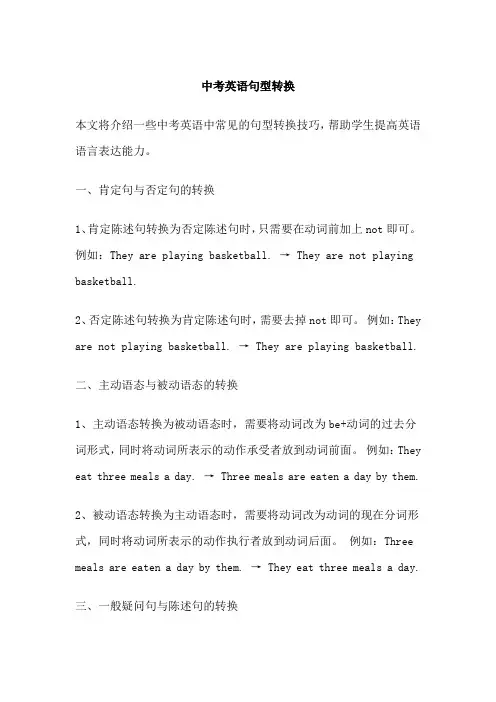
中考英语句型转换本文将介绍一些中考英语中常见的句型转换技巧,帮助学生提高英语语言表达能力。
一、肯定句与否定句的转换1、肯定陈述句转换为否定陈述句时,只需要在动词前加上not即可。
例如:They are playing basketball. → They are not playing basketball.2、否定陈述句转换为肯定陈述句时,需要去掉not即可。
例如:They are not playing basketball. → They are playing basketball.二、主动语态与被动语态的转换1、主动语态转换为被动语态时,需要将动词改为be+动词的过去分词形式,同时将动词所表示的动作承受者放到动词前面。
例如:They eat three meals a day. → Three meals are eaten a day by them.2、被动语态转换为主动语态时,需要将动词改为动词的现在分词形式,同时将动词所表示的动作执行者放到动词后面。
例如:Three meals are eaten a day by them. → They eat three meals a day.三、一般疑问句与陈述句的转换1、一般疑问句转换为陈述句时,需要将动词改为相应的陈述语气,同时将主语放到动词后面。
例如:Are they playing basketball? →They are playing basketball.2、陈述句转换为一般疑问句时,需要将动词改为一般疑问语气,同时将主语放到动词前面。
例如:They are playing basketball. →Are they playing basketball?四、时间状语从句的转换1、现在时态的时间状语从句转换为过去时态的时间状语从句时,需要将动词改为过去时态。
例如:I will go to the park tomorrow. → I went to the park yesterday.2、过去时态的时间状语从句转换为现在时态的时间状语从句时,需要将动词改为现在时态。
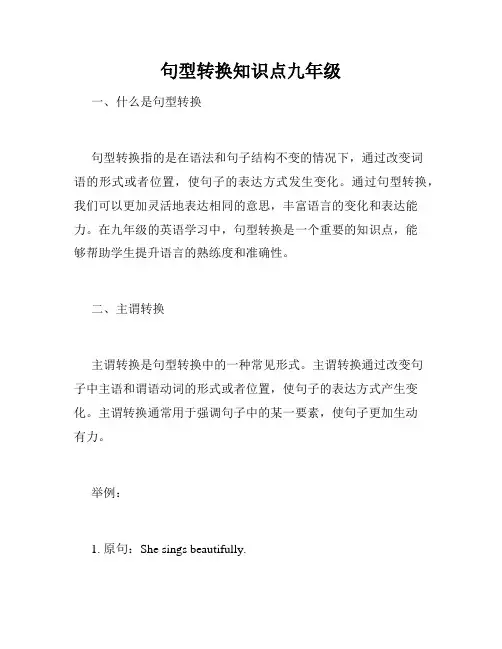
句型转换知识点九年级一、什么是句型转换句型转换指的是在语法和句子结构不变的情况下,通过改变词语的形式或者位置,使句子的表达方式发生变化。
通过句型转换,我们可以更加灵活地表达相同的意思,丰富语言的变化和表达能力。
在九年级的英语学习中,句型转换是一个重要的知识点,能够帮助学生提升语言的熟练度和准确性。
二、主谓转换主谓转换是句型转换中的一种常见形式。
主谓转换通过改变句子中主语和谓语动词的形式或者位置,使句子的表达方式产生变化。
主谓转换通常用于强调句子中的某一要素,使句子更加生动有力。
举例:1. 原句:She sings beautifully.转换后:Beautifully does she sing.2. 原句:They are playing football.转换后:Playing football are they.三、否定句转换否定句转换是句型转换中的另一种常见形式。
否定句转换通过在句子中加入否定词或者改变句子结构,使句子的意思相反。
否定句转换能够帮助我们更加准确地表达自己的意思,并且使句子的表达更加丰富多样。
举例:1. 原句:He has finished his homework.转换后:He hasn't finished his homework.2. 原句:We will go to the park tomorrow.转换后:We won't go to the park tomorrow.四、疑问句转换疑问句转换是句型转换中的又一常见形式。
疑问句转换通过改变句子结构或者词语顺序,将陈述句转换为疑问句,以询问某些信息或者确认某些情况。
疑问句转换能够帮助我们更好地进行沟通和交流,提高语言的应用能力。
举例:1. 原句:He is a teacher.转换后:Is he a teacher?2. 原句:They have finished their lunch.转换后:Have they finished their lunch?五、倒装句转换倒装句转换是句型转换中的一种特殊形式。
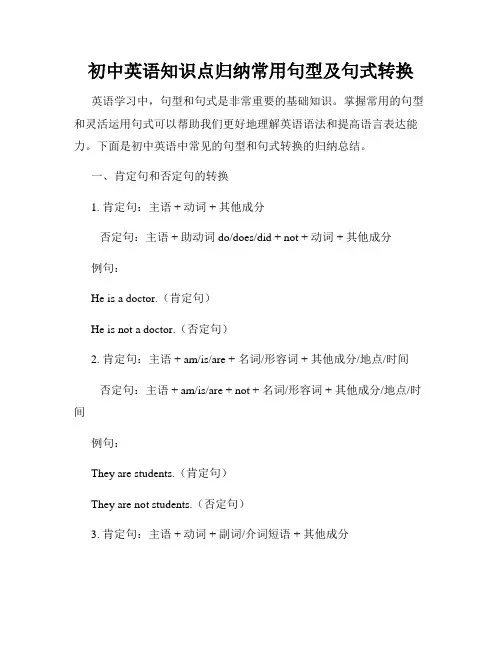
初中英语知识点归纳常用句型及句式转换英语学习中,句型和句式是非常重要的基础知识。
掌握常用的句型和灵活运用句式可以帮助我们更好地理解英语语法和提高语言表达能力。
下面是初中英语中常见的句型和句式转换的归纳总结。
一、肯定句和否定句的转换1. 肯定句:主语 + 动词 + 其他成分否定句:主语 + 助动词 do/does/did + not + 动词 + 其他成分例句:He is a doctor.(肯定句)He is not a doctor.(否定句)2. 肯定句:主语 + am/is/are + 名词/形容词 + 其他成分/地点/时间否定句:主语 + am/is/are + not + 名词/形容词 + 其他成分/地点/时间例句:They are students.(肯定句)They are not students.(否定句)3. 肯定句:主语 + 动词 + 副词/介词短语 + 其他成分否定句:主语 + 助动词 do/does/did + not + 动词 + 副词/介词短语 + 其他成分例句:She speaks English fluently.(肯定句)She does not speak English fluently.(否定句)二、一般疑问句和特殊疑问句的转换1. 一般疑问句:肯定句:Do/Does/Did + 主语 + 动词 + 其他成分?否定句:Do/Does/Did + 主语 + 动词 + not + 其他成分?特殊疑问句:疑问词 + 一般疑问句的语序例句:She goes to school by bus.(一般疑问句)Does she go to school by bus?(特殊疑问句)2. 一般疑问句:肯定句:Am/Is/Are + 主语 + 名词/形容词 + 其他成分/地点/时间?否定句:Am/Is/Are + 主语 + not + 名词/形容词 + 其他成分/地点/时间?特殊疑问句:疑问词 + 一般疑问句的语序例句:They are students.(一般疑问句)Are they students?(特殊疑问句)3. 一般疑问句:肯定句:助动词 + 主语 + 动词 + 副词/介词短语 + 其他成分?否定句:助动词 + Do/Does/Did + 主语 + 动词 + not + 副词/介词短语 + 其他成分?特殊疑问句:疑问词 + 一般疑问句的语序例句:He speaks English fluently.(一般疑问句)Does he speak English fluently?(特殊疑问句)三、陈述句和祈使句的转换1. 陈述句:主语 + 动词 + 其他成分祈使句:动词 + 其他成分(一般省略主语 you)例句:They play football.(陈述句)Play football.(祈使句)2. 陈述句:主语 + am/is/are + 名词/形容词 + 其他成分/地点/时间祈使句:Be + 名词/形容词 + 其他成分/地点/时间例句:You are a student.(陈述句)Be a student.(祈使句)3. 陈述句:主语 + 动词 + 副词/介词短语 + 其他成分祈使句:动词 + 副词/介词短语 + 其他成分例句:She speaks English fluently.(陈述句)Speak English fluently.(祈使句)通过以上的归纳总结,我们可以更好地理解和运用常用的句型和句式转换。
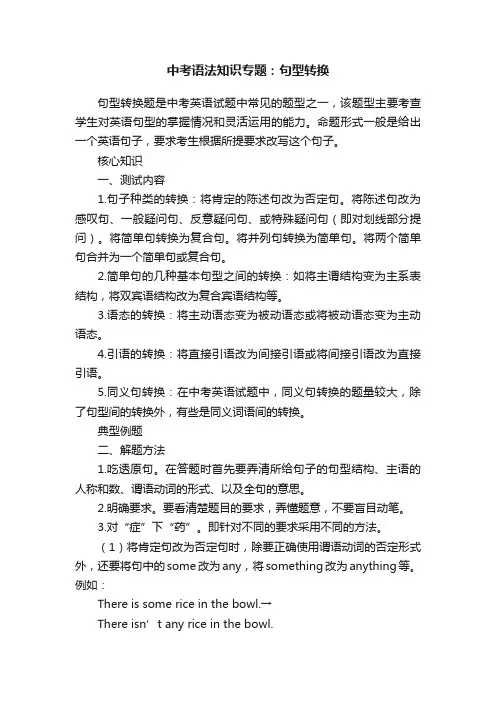
中考语法知识专题:句型转换句型转换题是中考英语试题中常见的题型之一,该题型主要考查学生对英语句型的掌握情况和灵活运用的能力。
命题形式一般是给出一个英语句子,要求考生根据所提要求改写这个句子。
核心知识一、测试内容1.句子种类的转换:将肯定的陈述句改为否定句。
将陈述句改为感叹句、一般疑问句、反意疑问句、或特殊疑问句(即对划线部分提问)。
将简单句转换为复合句。
将并列句转换为简单句。
将两个简单句合并为一个简单句或复合句。
2.简单句的几种基本句型之间的转换:如将主谓结构变为主系表结构,将双宾语结构改为复合宾语结构等。
3.语态的转换:将主动语态变为被动语态或将被动语态变为主动语态。
4.引语的转换:将直接引语改为间接引语或将间接引语改为直接引语。
5.同义句转换:在中考英语试题中,同义句转换的题量较大,除了句型间的转换外,有些是同义词语间的转换。
典型例题二、解题方法1.吃透原句。
在答题时首先要弄清所给句子的句型结构、主语的人称和数、谓语动词的形式、以及全句的意思。
2.明确要求。
要看清楚题目的要求,弄懂题意,不要盲目动笔。
3.对“症”下“药”。
即针对不同的要求采用不同的方法。
(1)将肯定句改为否定句时,除要正确使用谓语动词的否定形式外,还要将句中的some改为any,将something改为anything等。
例如:There is some rice in the bowl.→There isn’t any r ice in the bowl.They bought something in the supermarket.→They didn’t buy anything in the supermarket.(2)将陈述句改为一般疑问句时,要根据陈述句中的谓语动词及其时态形式确定其疑问式,同时还要注意将原句中的some改为any,将something改为anything等。
例如:I’ve got some money with me.→Have you got any money with you?Mr.Wang said something about the accident at themeeting.→Did Mr.Wang say anything about the accident at the meeting?(3)将陈述句改为反意疑问句时,除了遵循陈述部分若为肯定式,疑问部分则用否定式和陈述部分若为否定式,疑问部分则用肯定式的原则外,还要注意:当陈述部分含有little,few,no,nothing,never等否定意义的词时,疑问部分要用肯定形式。
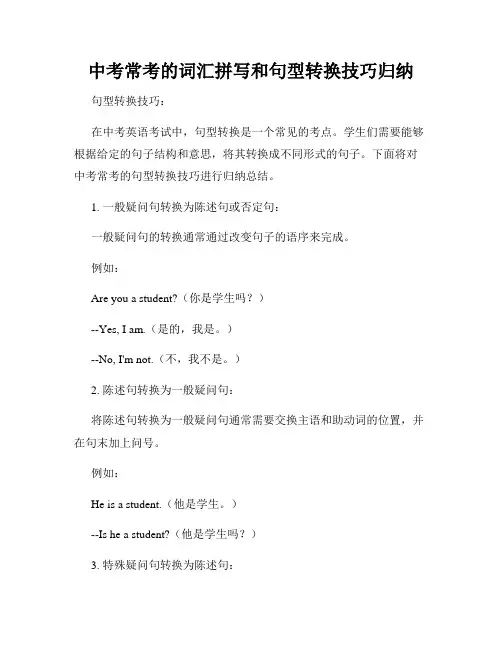
中考常考的词汇拼写和句型转换技巧归纳句型转换技巧:在中考英语考试中,句型转换是一个常见的考点。
学生们需要能够根据给定的句子结构和意思,将其转换成不同形式的句子。
下面将对中考常考的句型转换技巧进行归纳总结。
1. 一般疑问句转换为陈述句或否定句:一般疑问句的转换通常通过改变句子的语序来完成。
例如:Are you a student?(你是学生吗?)--Yes, I am.(是的,我是。
)--No, I'm not.(不,我不是。
)2. 陈述句转换为一般疑问句:将陈述句转换为一般疑问句通常需要交换主语和助动词的位置,并在句末加上问号。
例如:He is a student.(他是学生。
)--Is he a student?(他是学生吗?)3. 特殊疑问句转换为陈述句:特殊疑问句转换为陈述句需要将原句的疑问词替换为陈述句中对应的词语。
例如:What is your name?(你叫什么名字?)--My name is Mike.(我的名字叫迈克。
)4. 否定句转换为肯定句或一般疑问句:否定句转换为肯定句通常需要去掉否定词,并改变动词形式为肯定形式。
例如:I don't like bananas.(我不喜欢香蕉。
)--I like bananas.(我喜欢香蕉。
)否定句转换为一般疑问句则要交换助动词和主语的位置,并在句末加上问号。
例如:I don't like basketball.(我不喜欢篮球。
)--Don't you like basketball?(你不喜欢篮球吗?)5. 直接引语转换为间接引语:直接引语转换为间接引语通常需要改变动词的时态和人称,并在引语前后加上引号。
例如:"I like swimming," he said.(他说:“我喜欢游泳。
”)--He said that he liked swimming.(他说他喜欢游泳。
)词汇拼写技巧:除了句型转换,词汇拼写是中考英语考试中另一个常见的考点。
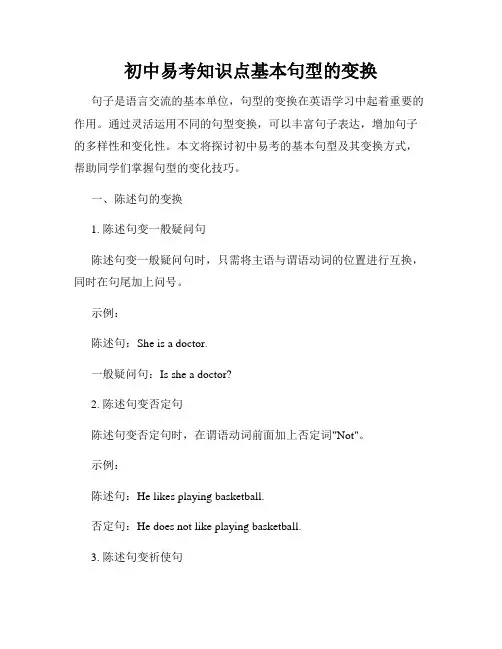
初中易考知识点基本句型的变换句子是语言交流的基本单位,句型的变换在英语学习中起着重要的作用。
通过灵活运用不同的句型变换,可以丰富句子表达,增加句子的多样性和变化性。
本文将探讨初中易考的基本句型及其变换方式,帮助同学们掌握句型的变化技巧。
一、陈述句的变换1. 陈述句变一般疑问句陈述句变一般疑问句时,只需将主语与谓语动词的位置进行互换,同时在句尾加上问号。
示例:陈述句:She is a doctor.一般疑问句:Is she a doctor?2. 陈述句变否定句陈述句变否定句时,在谓语动词前面加上否定词"Not"。
示例:陈述句:He likes playing basketball.否定句:He does not like playing basketball.3. 陈述句变祈使句陈述句变祈使句时,除去主语,将谓语动词直接使用原形,表示一种命令、请求或建议。
示例:陈述句:You should study hard.祈使句:Study hard.二、疑问句的变换1. 一般疑问句变陈述句一般疑问句变陈述句时,将疑问句中的助动词或情态动词去掉。
示例:一般疑问句:Do you like ice cream?陈述句:You like ice cream.2. 特殊疑问句变陈述句特殊疑问句变陈述句时,将特殊疑问句中的疑问词与句子其他部分保持原来顺序即可。
示例:特殊疑问句:Where is the library?陈述句:The library is at the corner of the street.三、否定句的变换1. 否定句变陈述句否定句变陈述句时,去掉否定词"Not"。
示例:否定句:He does not like playing soccer.陈述句:He likes playing soccer.2. 否定句变一般疑问句否定句变一般疑问句时,只需将否定词"Not"与陈述句的其他部分交换位置即可。
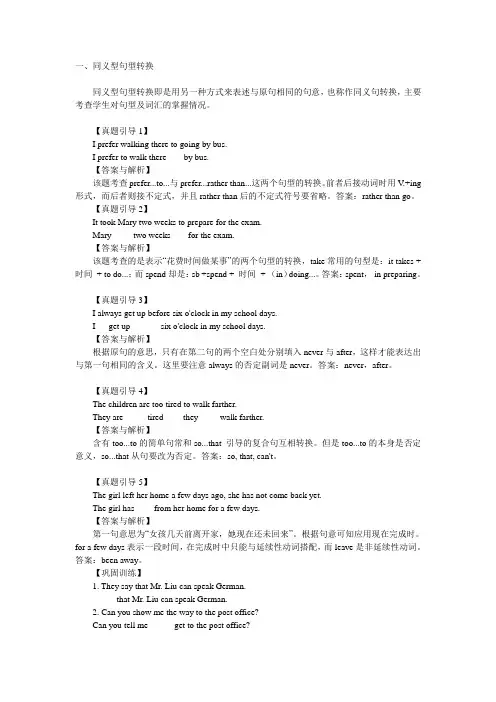
一、同义型句型转换同义型句型转换即是用另一种方式来表述与原句相同的句意,也称作同义句转换,主要考查学生对句型及词汇的掌握情况。
【真题引导1】I prefer walking there to going by bus.I prefer to walk there ___ by bus.【答案与解析】该题考查prefer...to...与prefer...rather than...这两个句型的转换。
前者后接动词时用V.+ing 形式,而后者则接不定式,并且rather than后的不定式符号要省略。
答案:rather than go。
【真题引导2】It took Mary two weeks to prepare for the exam.Mary ____ two weeks ___ for the exam.【答案与解析】该题考查的是表示“花费时间做某事”的两个句型的转换,take常用的句型是:it takes +时间+ to do...;而spend却是:sb +spend + 时间+ (in)doing...。
答案:spent,in preparing。
【真题引导3】I always get up before six o'clock in my school days.I __ get up ______ six o'clock in my school days.【答案与解析】根据原句的意思,只有在第二句的两个空白处分别填入never与after,这样才能表达出与第一句相同的含义。
这里要注意always的否定副词是never。
答案:never,after。
【真题引导4】The children are too tired to walk farther.They are_____ tired ____they ____ walk farther.【答案与解析】含有too...to的简单句常和so...that 引导的复合句互相转换。
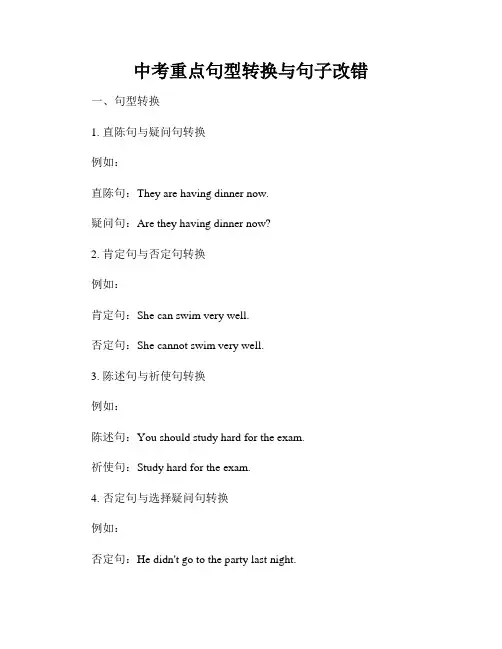
中考重点句型转换与句子改错一、句型转换1. 直陈句与疑问句转换例如:直陈句:They are having dinner now.疑问句:Are they having dinner now?2. 肯定句与否定句转换例如:肯定句:She can swim very well.否定句:She cannot swim very well.3. 陈述句与祈使句转换例如:陈述句:You should study hard for the exam.祈使句:Study hard for the exam.4. 否定句与选择疑问句转换例如:否定句:He didn't go to the party last night.选择疑问句:Did he go to the party last night?5. 特殊疑问句转换为陈述句例如:特殊疑问句:What is your favorite color?陈述句:My favorite color is blue.二、句子改错(以下为例句,具体句子改错内容可自行拓展)1. We will go to the park after we finished our homework.改正:We will go to the park after we finish our homework.2. The girl is very kind and always help others.改正:The girl is very kind and always helps others.3. What interesting news did you hear from your friend?改正:What interesting news did you hear from your friends?4. He told me that don't forget to bring my umbrella.改正:He told me not to forget to bring my umbrella.5. Are you going to visit your grandparents or go shopping this weekend?改正:Are you going to visit your grandparents or are you going shopping this weekend?6. The weather is very nice, so we decided to take a walk and went to the park.改正:The weather is very nice, so we decided to take a walk and go to the park.7. Can you let me know where is the nearest bus stop?改正:Can you let me know where the nearest bus stop is?8. My brother said if he has enough time, he will go to the party with us.改正:My brother said if he has enough time, he would go to the party with us.三、总结以上是中考重点句型转换与句子改错的内容。
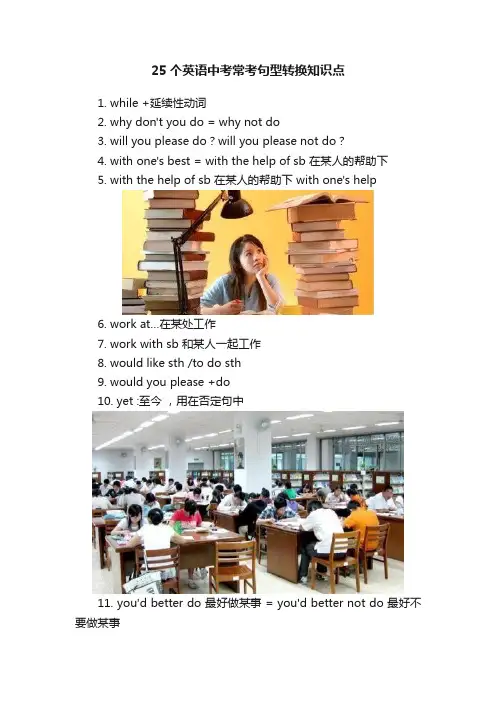
25个英语中考常考句型转换知识点1. while +延续性动词2. why don't you do = why not do3. will you please do?will you please not do?4. with one's best = with the help of sb 在某人的帮助下5. with the help of sb 在某人的帮助下 with one's help6. work at…在某处工作7. work with sb 和某人一起工作8. would like sth /to do sth9. would you please +do10. yet :至今,用在否定句中11. you'd better do 最好做某事 = you'd better not do 最好不要做某事12. 系动词(taste吃起来/sound听起来/look看起来/semll闻起来)+adj13. 名词、副词、形容词修饰 enongh 时, 形容词放在之前,名词副词放在之后14. 太多 too much +不可数 too many +可数 much too 相当于very ,修饰形容词15. 向宾语提问:Whom16. 向地点提问:Where17. 向方式提问:How18. 向价格和不可数名词提问:How much19. 向可数名词提问:How many20. 向频率提问: How often21. 向时间段提问:How long22. 向时间提问:what time/when23. 向物主代词提问:Whose24. 向职业提问:what do/does……do25. 向主语提问: Who。
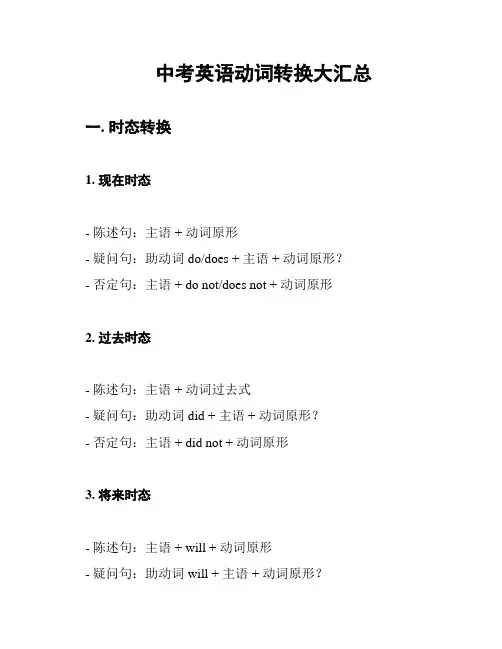
中考英语动词转换大汇总
一. 时态转换
1. 现在时态
- 陈述句:主语 + 动词原形
- 疑问句:助动词do/does + 主语 + 动词原形?
- 否定句:主语 + do not/does not + 动词原形
2. 过去时态
- 陈述句:主语 + 动词过去式
- 疑问句:助动词did + 主语 + 动词原形?
- 否定句:主语 + did not + 动词原形
3. 将来时态
- 陈述句:主语 + will + 动词原形
- 疑问句:助动词will + 主语 + 动词原形?
- 否定句:主语 + will not + 动词原形
二. 词性转换
1. 名词转动词
- 例如:action(名词)→ act(动词)
2. 动词转名词
- 例如:play(动词)→ player(名词)
3. 形容词转名词
- 例如:happy(形容词)→ happiness(名词)4. 形容词转副词
- 例如:quick(形容词)→ quickly(副词)
5. 名词转形容词
- 例如:danger(名词)→ dangerous(形容词)
三. 相关动词转换
1. 动词 + -ing
- 例如:read → reading
2. 动词 + -ed
- 例如:play → played
3. 动词 + -s/-es
- 例如:walk → walks
4. 动词 + -ing/-ed
- 例如:ski → skiing → skied
5. 动词 + -er/-est
- 例如:big → bigger → biggest
以上就是中考英语动词转换的大汇总,希望对你的学习有所帮助!。
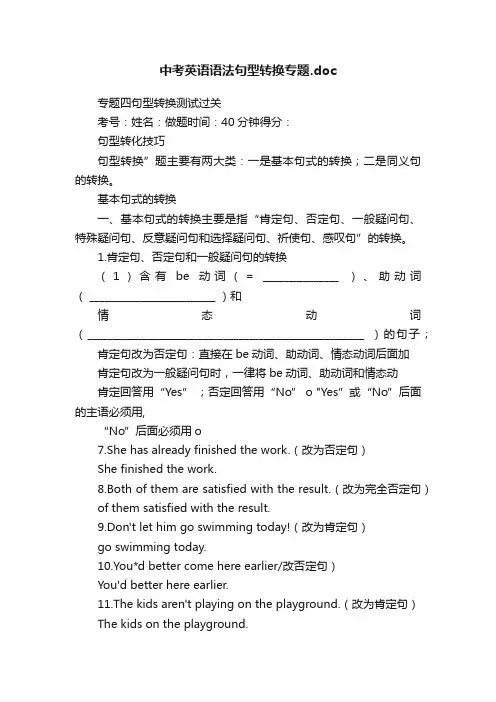
中考英语语法句型转换专题.doc专题四句型转换测试过关考号:姓名:做题时间:40分钟得分:句型转化技巧句型转换”题主要有两大类:一是基本句式的转换;二是同义句的转换。
基本句式的转换一、基本句式的转换主要是指“肯定句、否定句、一般疑问句、特殊疑问句、反意疑问句和选择疑问句、祈使句、感叹句”的转换。
1.肯定句、否定句和一般疑问句的转换(1)含有be动词(= _______________ )、助动词( _________________________ )和情态动词(_______________________________________________________ )的句子;肯定句改为否定句:直接在be动词、助动词、情态动词后面加肯定句改为一般疑问句时,一律将be动词、助动词和情态动肯定回答用“Yes” ;否定回答用“No” o "Yes”或“No”后面的主语必须用,“No”后面必须用o7.She has already finished the work.(改为否定句)She finished the work.8.Both of them are satisfied with the result.(改为完全否定句)of them satisfied with the result.9.Don't let him go swimming today!(改为肯定句)go swimming today.10.You*d better come here earlier/改否定句)You'd better here earlier.11.The kids aren't playing on the playground.(改为肯定句)The kids on the playground.12.All of us want to take a break.(改为完全否定句)of us to take a break.13.Lucy does her homework on Saturdays.(改为否定句)Lucy her homework on Saturdays.14.Han Mei has to take care of her little brother today.(改为否定句)Han Mei to take care of her little brother at weekends.15.1think you are a clever boy,(改为否定句)I think you a clever boy.16.He isn't going to do anything on weekends.(改为肯定句)He going to do on weekends2.特殊疑问句的转换把句子转换为特殊疑问句,首先要确定划线部分的“疑问词”,人、物、时间、地点、原因、数量等分别用:; ; ; ; ; ; ; ; ;; ; ; 等。
英语语法大全句子地转换与合并Ⅰ.简单句之间地转换句型地转换是指一个句子由一种语法结构变为另一种语法结构,而不改变其原来地意义.这是一种有用地练习,可以学会许多不同地说法,能从几个句子中挑选出最适当地句子形式.资料个人收集整理,勿做商业用途.主动语态与被动语态之间地转换一个句子可以由主动结构变为被动结构,也可从被动结构变为主动结构..资料个人收集整理,勿做商业用途..肯定句与否定句之间地转换一个句子可以由肯定形式变为否定形式,也可由否定形式变为肯定形式:.资料个人收集整理,勿做商业用途...........反问型问句与陈述句之间地转换反问型问句()可以转变为陈述句:.?.?.?.?..不同词类之间地转换几乎任何词类都可以转换为另一词类.可以是:.动词与名词间地转换:..资料个人收集整理,勿做商业用途...动词与形容词之间地转换:.....动词与副词间地转换:....名词与形容词间地转换:.,.资料个人收集整理,勿做商业用途...名词与副词间地转换:.,...形容词与副词间地转换:,...介词与连词间地转换:....Ⅱ.简单句与复合句之间地转换一个分词、动名词、不定式或介词短语可以转换为复合句,反过来也如此:—,.,.,...,.,.,.,..Ⅲ.简单句与复杂句之间地转换一个词或是短语可以转变为名词从句、定语从句或状语从句,反过来也如此:.名词从句......资料个人收集整理,勿做商业用途....定语从句-...-.-....状语从句.资料个人收集整理,勿做商业用途,..资料个人收集整理,勿做商业用途.,.' .,...大部分短语不仅可以变为并列地分句,也可以变为状语从句.Ⅳ.复杂句与复合句之间地转换...,.,.资料个人收集整理,勿做商业用途.,.,.,.Ⅴ.直接引语和间接引语之间地转换说话人讲地话可以用两种方式来引用.如果引用他地原话,就称作直接引语.因此,“ .”为直接引语.如果按引用人地观点来引用,则称为间接引语.因此.为间接引语.这样地动词称为引话动词,它前面地主语,例如,可称为第一主语.引语中地主语,如及,称为第二主语.引语中地谓语动词称为第二动词.当直接引语转换为间接引语,或间接引语转换为直接引语时,有几个问题需要注意..大写与标点直接引语放在引号之内,第一个字母要大写,引号前加逗号(间或用冒号),引语末加句号、问号或感叹号,但在间接引语中却不加这些.间接引语必须由,()或疑问词(,,等)开头,末尾要加句号.此外,在直接引语中问句可能有倒装语序(助动词放在主语前面),但在间接引语中,问句则需变为自然语序:,“ .”:“ ?”.引话动词与第二动词引话动词可以是,,,,,;,,;,;,;,,,,;,;,,,,;,;,,;,,,;,,等等.若引话动词是现在时或将来时,则当引语由直接变为间接时,第二动词照旧不变.但若引话动词是过去时,则间接引语中地第二动词,就要由现在时变为过去时,由过去时变为过去完成时等.(),“ (,).”()(,).,“ (,).(,)..引话动词与连词.如果间接引语为陈述句,它前面通常都有:,,,,….如果它是问句,它前面通常有:()(),(),(),,;或()+(即疑问词,如,,,,),()+,….如果它是感叹句,它前面通常有:,,….如果间接引语为祈使句,它前面通常有:,,,,,…且里面包含助动词.此外间接引语还可以转换为不定式短语,这时引话动词需要改为宾补动词:.,“ ”.,“ .”.,“ ?”,“ ?”,“ ?”..,“ !”,“!.”,“ !.”资料个人收集整理,勿做商业用途,“!.”.,“ .”,“ .”.代词此外还要注意,把直接引语变为间接引语时,代词需作改变.如果在直接引语中代词为第一人称,在变为间接引语时,将变为与第一主语一致地代词.,“ .”.,“ .”资料个人收集整理,勿做商业用途,“ .”,“ .”,“ .”“ .”(中包括)资料个人收集整理,勿做商业用途如果在直接引语中,代词为第二人称,在间接引语中它将变成与引话动词地宾语一致地人称:,“ .”,“ .”,“ .”,“ .”,“ .”也可看作是宾语:(),“ .”,“ .”引话动词地宾语有时可以省略,但它在间接引语中可能需要说出来:.,“ .”… .如果在直接引语中代词为第三人称,在间接引语中,它可以保持不变:,“ .”,“ .”,“ .”,“ .”(这两个代表两个不同地人)还需指出,上述代词,在直接或间接引语中,可以为任何“格”,而不仅仅是主格:,“ .”“ !”.时间副词(短语)间接引语中地时间副词(短语)可能和直接引语中地时间副词(短语)不同,这是因为原来说话人提到地时间可能与现在引话人提到地时间不同:,“ .”,“ .”().,“ .”().,“ .”().,“ !”()..第一主语及引话动词地位置在新闻报导中第一主语有时放在引话动词地后面:,“…”.,“…”,“…”第一主语及引话动词,除了放在直接引语前面外,还可放在其他位置:,“!.”“!” ,“ .”(但不说)“!,” .(但不说)“!.”(如果大家都清楚这话是谁说地,第一主语及引话动词也可不必说出.)在第一主语及引话动词放在其他位置时,要注意标点符号:,“,;..”“,” ,“ ;..”“,,” ;“ ,.”如果引话动词有较长地修饰语,最好把它放在主语及引话动词前面,如果主语及引话动词在直接引语后面,长修饰语最好放在引话动词后面:,“' .”“' ,” .如果主语和引话动词放在直接引语地中间或后面,作主语地名词可以放在引话动词地后面或前面(若主语是人称代词,只能放在动词后面):“ ,” (,).(很少说)“ !” (,).(很少说)Ⅵ.简单句地合并两个或更多简单句可以合并成一个比较复杂地句子,这种练习对学习写作地人很有好处.两个或更多简单句可借助并列连词合并成一个复合句:.......资料个人收集整理,勿做商业用途两个或更多简单句,可以加上从属连词,把一个或更多句子变为名词从句、定语从句或状语从句,这样来合并成为一个复杂句..变成名词从句:....资料个人收集整理,勿做商业用途?.?..变成定语从句:?....' ..变成状语从句:.,.........两个或更多简单句,也可以把其中一个或更多简单句变成一个短语,甚至一个词,来合并成一个较为复杂地简单句:...(用同位语代替一个句子)..(用介词短语代替句子)..(用“介词动名词”结构代替句子)资料个人收集整理,勿做商业用途..(用不定式代替句子)..(用分词代替句子)资料个人收集整理,勿做商业用途。
中考英语语法大全之句型转换Ⅰ.题型介绍所谓“句型转换”就是先给一个完整的句子A,再根据括号内的要求(有时没有明确,须自己观察),在第二个句子B的空白处填上适当的词来完成的句型转换。
Ⅱ.题型分类从形式上看,有如下几种形式:①某一词或词组的转换;②词组与句子的转换;③同义句型的转换;④为纠正常犯语言错误而设计的题目。
从内容上看,此题型涉及的面较广,主要有:①句子功能方面的转换。
包括陈述句(肯定与否定)、四种题疑问句、祈使句、感叹句的转换;②句子结构方面的转换。
即简单句、复合句、并列句之间的转换;③语态的转换。
即主动语态与被动语态之间的转换;④常用句型与词汇手段的转换。
Ⅲ.具体分类如下一、陈述句与疑问句、祈使句、感叹句间的转换1、陈述句中肯定句变为否定句,大部分是用not来改变谓语结构,但也有借用否定意义的词,如nothing, nobody, none, neither, little, few, never, hardly等,例如::A:Tom does well in maths.B:Tom doesnt do in maths.A:He has much to do.B:He has nothing to do.A:All of my classmates like art.B:None of my classmates likes art.2、改为疑问句。
根据上下句的结构和词的减少,来判断变为哪一种形式的疑问句。
例如:A:My brother often has breakfast at school.B: Does your brother often have breakfast at school?A:Toms already weak in English.B:Toms already weak in English, isnt he ?A:The red light changes every two minutes.B:How often does the red light change?3、改为感叹句。
中考重点语法时态语态句型转换一、时态转换1. 英语时态总结英语中常见的时态有:一般现在时、一般过去时、一般将来时、现在进行时、过去进行时、现在完成时、过去完成时、过去将来时等。
2. 时态转换实例2.1 一般现在时与一般过去时例句:一般现在时:She speaks English fluently.一般过去时:She spoke English fluently.2.2 一般现在时与一般将来时例句:一般现在时:I go to school by bus.一般将来时:I will go to school by bus.2.3 现在进行时与过去进行时例句:现在进行时:They are playing soccer now.过去进行时:They were playing soccer at that time.2.4 现在完成时与过去完成时例句:现在完成时:I have seen that movie before.过去完成时:I had seen that movie before.2.5 一般过去时与过去将来时例句:一般过去时:He ate breakfast at 7 o'clock yesterday.过去将来时:He would eat breakfast at 7 o'clock tomorrow.二、语态转换1. 英语语态总结英语中常见的语态有:主动语态和被动语态。
在被动语态中,要注意动词的形式变化和助动词的使用。
2. 语态转换实例2.1 主动语态转被动语态例句:主动语态:She cooks dinner every day.被动语态:Dinner is cooked by her every day.2.2 被动语态转主动语态例句:被动语态:The book was written by him.主动语态:He wrote the book.三、句型转换1. 英语句型总结英语中常见的句型包括:陈述句、疑问句、祈使句、感叹句等。
中考英语同义句句型转换大全一同义词互相转换1 alone=by oneselfWe finished the work alone./by ourselves.2 actually=in factActually, this question is very easy./ In fact, this question is very easy.3 also=too=as wellHe’s also a member of us./He’s a member of us, too./He’s a member of us as well.4 another=one moreI’m afraid you have to wait for another ten minutes./I’m afraid you have to wait ten more minutes.5 arrive in(at)/=get to=reachWhen she arrived in/got to/reached America, she suddenly felt lonely.6 at once=right nowRun home at once=Run home right now.7 continue/go onLet’s continue/go on reading the passage.8 cost=spend=take=pay(1)I spent ten yuan of/(in) buying this book../This book cost me tenyuan./I paid ten yuan for this book.(2)It took us three days to fulfill this task./We spent three days on thistask/in fulfilling this task.9 cross=go acrossBefore crossing/going across the road, please look both sides.10 sometimes/=t timesHe is a good man, but he can be really bad-tempered sometimes./at times.11 die/=ose one’s lifeThose people died/lost their lives during the earthquake.12 now/at the momentShe is talking about the problem with her classmates now./at the moment 13 else=otherWhat else/other things can you see in the picture?14 then=t that moment/at that timeShe was shopping then/at that moment/at that time, so she knew nothing about it.15 like/love/enjoy/be fond of/be interested in/care forShe likes/enjoys/loves/is fond of/is interested in/cares for collecting stamps very much.16 will/be going to/be about toThe teachers will/are going to/are about to have a meeting tomorrow afternoon.17 want/would likeDo you want to go abroad to study further?/Would you like to go abroad to study further/18 can/be able to/have the ability to doCan you tell me the way to the library?/Are you able to tell me the way to the library?/Do you have the ability to tell me the way to the library?19 visit/call onLin Tao visited/called on his grandparents last week.20 favorite/like bestWhat’s your favorite sport?/What sport do you like best?21 happen/take placeWhat happened?/What took place?22 decide/make a decision/make up one’s mindShe can’t decide/make a decision/make up her mind where to go.23 found/establish/set upThe students founded/established/set up a group to protect the environment.24 finally/at last/in the endFinally/At last/In the end, she won the race.25 leave/be awayHe left yesterday./He has been away for a day.26 return/give backHe hasn’t returned the book to me./He hasn’t given the book back to me. return/go backHe will go back/return in a month.27 why/what for/how come-She cried so badly. –How come?What did she cry so sadly for?/Why did she cry so badly?28 over/more thanOver/More than a hundred people tried this new kind of food.29 whatever/no matter whatWhatever/No matter what you find in the box, they belong to Amy.30 whenever/no matter whenWhenever/No matter when you come to see me, I will treat you as my relative.31 walk/ go…on footDo you walk to school every day?/Do you go to school on foot every day?32 should/ought to/be supposed toWe should/ought to/are supposed to use both sides of the paper to reduce wastes.33 population/peopleWhat is the population of China?/How many people are there in China?34 quit/stop/drop/give upMy father quitted/stopped/dropped/gave up smoking.35 maybe/perhaps/may beMaybe/Perhaps it is not my pen./ The pen may not be mine.二同义词组互相转换1 a lot of/lots ofA lot of/Lots of artists will show their faces at the party.2 all over the world/around the worldEnglish is spoken widely all over the world./around the world3 not as(so)…as/less thanThis book is not as(so) interesting as that one./That book is more interesting than this one.4 as…as possible/as…as sb canRun home as fast as possible/as fast as you can to tell your mother the good news.5 at risk/in danger/in troubleThe pandas in our country are at risk./in trouble/in danger6 at the age of…/when sb.+be+…years oldHis parents died when he was six years old./His parents died at the age of six.7 because of/due to/as a result of/with one’s help/thanks toBecause of?/Due to/As a result of his help, he passed this exam.With his help/With the help of him, he passed the exam./Thanks to his help, he passed the exam.8 be careful/look out/take careLook out!/Be careful/Take care! The flood is coming.9 be worried about/worry aboutLiu Ming is worried about his following oral test./Liu Ming can’t stop his following oral test.10 both…and…/not only…but also…He is not only a singer but also a doctor./He is both a singer and a doctor.11 be good at/do well inHe is good at drawing./He does well in drawing.12 be proud of/take pride inWe are all proud of our country’s astronaut./He takes pride in ourcountry’s astronaut.13 come up with/think of/have an ideaTome came up an idea./Tom thought of an idea./Tom had an idea.14 ride a bike/go…by bikeHe often rides a bike to work./He often goes to work by bike.15 come from/be fromWhere do you come from?/Where are you from?16 have a good time/enjoy oneself//play happilyWe had a good time/enjoyed ourselves/played happily on Christmas Day.17 have a pain in head/have a headacheHe didn’t go to school today, because he had a pain in head./had a headache18 hear from/receive(get) a letter fromShe is very happy to hear from/receive a letter from a Canadian friend. 19 had better do/It’s best to doYou had better read in the sun./It’s best for you to read in the sun.20 how about/what aboutHow about/What about going skating?21 in order to/in order that/to do/so thatHe worked day and night to be a successful man./He worked day and night in order to be a successful man./He worked day and night in order that he could be a successful man./He worked day and night so that he could be a successful man.22 keep off/keep away fromKeep off /Keep away from the grass!23 in/wearShe is in/wears a white dress today.24 keep sb. from doing/stop sb. (from) doing/prevent sb. (from) doing Trees can stop the soil flowing away./ Trees can prevent the soil flowing away./Trees can keep the soil from flowing away.25 learn …by oneself/ teach oneselfNobody taught him. He learnt it by himself./He taught himself.26 like …better than/prefer…to…/prefer to do…rather than do …John likes swimming better than skating./John prefers swimming to skating./John prefer to swim rather than skate.27 long, long ago/once upon a timeLong, long ago/Once upon a time, there was a beautiful princess living in an old castle.28 look after well/take good care ofThanks for looking after my cat /taking good care of my cat well while I was away.29 no longer/not …any longerShe is no longer a little girl./She is not a little girl any longer.30 shall we/Let’s..Shall we watch the film together?/Let’s watch the film together.31 take part in/join in/participate inHe took part in /joined in/participated in the match.32 too…to/so…that…/enough to…He is too busy to visit us./He is so busy that he can’t visit us./He is not free enough to visit us.三同义句型互相转换1运用两种时态(一般过去时和现在完成时互相转换)(1)He left last year.(2)He has been away for one year.(3)He has been away since a year ago.(4)It is a year since he left.(5)One year has passed since he left.2最高级和比较级的互相转换(1)He is the tallest student in his class.(2)He is taller than any other student in his class.(3)He is taller than the other students in his class.(4)No one else is taller than him in his class.3运用两种语态(主动语态和被动语态互相转换)I clean my room every day./My room is cleaned every day. 4感叹句的两种句型之间互相转换What a careful girl she is!/How careful the girl is!5运用关联词语合并句子(1)Amy can’t dance. Susan can’t, either.Neither Amy nor Susan can dance.(2)I has eaten breakfast and my mother has eaten it, too.Both my mother and I have eaten breakfast.6运用复合句和不定式互相转换(1)I hope that I can visit the moon one day./I hope to visit the moon oneday.(2)He told me how he could use a computer./He told me how to use acomputer.7运用不同的句式结构互相转换(1)She wants to go shopping and her friends want to go shopping,too./She wants to go shopping, and so do her friends.(2)He went to bed after he finished his homework./He went to bed afterfinishing his homework./He didn’t go to bed until he finished his homework.(3)Come on, or we’ll miss the early bus./If we don’t hurry, we’ll miss theearly bus.(4)The man gave us a talk last week, and he will give us another talk thisweek./The man who gave us a talk last week will give us another talk this week.8用it做形式主语互相转换(1)He can finish the work easily./It is easy for him to finish the work.(2)We found it hard to shake./We found it was hard to skate.。
专题三、句型转换【知识盘点】句型转换这一题型是先给出一个句子,然后再给出一个包含几个空白处的句子,要求根据括号内的具体要求在第二句的空白处填入适当的词来完成。
它有完全的句式转换和句子中某一部分或几部分的转换。
该题型主要考查同学们的语言基础知识及句子结构的构成、变化、运用等。
其特点是规律性强、灵活性小,旨在考查考生用不同的句型结构来表达相同、相近或相反的语意的能力,训练灵活运用语言的技巧。
【命题规律】从题型上看,句型转换可分为两大类:一是按要求改写句子。
即按照指定要求将原句改写成其他形式的句子,如肯定句改为否定句,陈述句改为一般疑问句、特殊疑问句、反意疑问句、感叹句,对划线部分提问等。
另一类是同义句、近义句的转换,即要求用不同的句型,不同的语言手段表达相同的思想。
【命题趋势】从近年来的考题趋势来看,句型转换从单纯测试语法知识向改变句子结构填空,填词后使句意不变或与要求相符的方向发展。
其中许多属于常用句型。
【解题技巧】一、肯定句改为否定句1. 改变谓语结构在系动词be, become, feel, smell等,助动词be, have, do 等以及情态动词can, may, should等后加not。
如果句子的谓语中不是以上这些词,而是行为动词,则相应地将动词的原形,第三人称单数或过去式变为否定形式。
如:He has seen the film before.→He hasn’t seen the film before.He will write the book in two months.→He won’t write the book in two months.He does his homework in the evening.→He doesn’t do his homework in the evening.2. 用含否定意义的词(如never, nothing, nobody, none, neither, little, few等)。
初中知识点归纳直接和间接的宾语从句的句型转换初中知识点归纳:直接和间接宾语从句的句型转换直接宾语从句和间接宾语从句是中学英语语法中比较重要的知识点。
它们在句子中起到连接主语和谓语动词之间的作用。
本文将对直接宾语从句和间接宾语从句的句型转换进行归纳总结。
一、直接宾语从句的句型转换直接宾语从句是指在一个复合句中,宾语的内容由一个完整的句子来充当。
在转换时,要注意主谓一致和时态的变化。
1. 宾语从句为陈述句:主句:S + V + O宾语从句:S + V转换方式:将宾语从句的主谓变成陈述句的宾语部分,保持时态一致。
例句:直接说:我不知道他是否会来。
间接说:我不知道他会来。
2. 宾语从句为疑问句:主句:S + V + O宾语从句:?转换方式:将宾语从句的疑问词和主谓翻转,作为陈述句的宾语部分,保持时态一致。
例句:直接说:他问我什么时候离开。
间接说:他问我我什么时候离开。
3. 宾语从句为祈使句:主句:S + V + O宾语从句:V + ~?转换方式:将宾语从句的动词改成原形,并在后面加上"~",再将疑问词和主谓翻转,作为陈述句的宾语部分,保持时态一致。
例句:直接说:他建议我们走得快点。
间接说:他建议我们快点走。
二、间接宾语从句的句型转换间接宾语从句是指在一个复合句中,谓语动词后面有一个宾语和一个间接宾语,宾语由一个完整的句子来充当。
在转换时,要注意主谓一致和时态的变化。
1. 间接宾语从句为陈述句:主句:S + V + O + IO间接宾语从句:S + V转换方式:将间接宾语从句的主谓变成陈述句的间接宾语部分,保持时态一致。
例句:直接说:我告诉他我们已经完成作业。
间接说:我告诉他我们已经完成作业。
2. 间接宾语从句为疑问句:主句:S + V + O + IO间接宾语从句:?转换方式:将间接宾语从句的疑问词和主谓翻转,作为陈述句的间接宾语部分,保持时态一致。
例句:直接说:她问我你会不会游泳。
中考英语语法大全:句型转换句型转换每年的中考试卷中,“句型转换”题所占分值较大,是为了全面考查学生在初中阶段所学的词汇(同义或反义)、短语、句型和语法等方面的知识及其它的之间的灵活运用能力。
Ⅰ.题型介绍所谓“句型转换”就是先给一个完整的句子A,再根据括号内的要求(有时没有明确,须自己观察),在第二个句子B的空白处填上适当的词来完成的句型转换。
Ⅱ.题型分类从形式上看,有如下几种形式:①某一词或词组的转换;②词组与句子的转换;③同义句型的转换;④为纠正常犯语言错误而设计的题目。
从内容上看,此题型涉及的面较广,主要有:①句子功能方面的转换。
包括陈述句(肯定与否定)、四种题疑问句、祈使句、感叹句的转换;②句子结构方面的转换。
即简单句、复合句、并列句之间的转换;③语态的转换。
即主动语态与被动语态之间的转换;④常用句型与词汇手段的转换。
Ⅲ.具体分类如下一、陈述句与疑问句、祈使句、感叹句间的转换1、陈述句中肯定句变为否定句,大部分是用not来改变谓语结构,但也有借用否定意义的词,如nothing, nobody, none, neither, little, few, never, hardly等,例如::A:Tom does well in maths.B:Tom doesn't do in maths.A:He has much to do.B:He has nothing to do.A:All of my classmates like art.B:None of my classmates likes art.2、改为疑问句。
根据上下句的结构和词的减少,来判断变为哪一种形式的疑问句。
例如:A:My brother often has breakfast at school.B:Does your brother often have breakfast at school?A:Tom's already weak in English.B:Tom's already weak in English, isn't he ?A:The red light changes every two minutes.B:How often does the red light change?3、改为感叹句。
根据所给的句子结构和单词的词性,来确定使用哪一种感叹句的形式,例如:A:This is an interesting book.B:What an interesting book this is!或How interesting this book is!二、同义句转换。
根据上句,写出一个意思相同(或相近)的下句,此类形式繁多,内容复杂,涉及面广,归类如下:1、同义词或词组之间的转换。
(通常上下句时态保持一致)。
常见的同义词或词组有:(1)四个“花费”(spend-take-cost-take);(2)三个“到达”(get to-reach-arrive in/at);(3)四个“收到…来信”(hear from-get a letter from-receive a letter from-have a letter from);(4)两个“擅长于…”(be good at -do well in);(5)两个“有空”(be free-have time);(6)三个“入睡”(go to sleep-get to sleep-fall asleep);(7)两个“玩得开心”(enjoy oneself-have a good time);(8)“给…打电话”(call sb-telephone sb-ring sb. a call-make a telephone to sb.)(9)“飞往…”(fly to…-go to…byair/plane)(10)“自学”(teach oneself-learn…by oneself)(11)在…方面帮助help…with…-help…(to)do…(12)在…差be weak in…-do badly in…(13)能/会…can-be able to(14)更喜欢…like…better than…-prefer…to…(15)充满了…be full of…-be filled with…(16)放弃干…give up doing…-stop doing…(17)不再…no longer-not …any longer(18)照顾/保管take care of…-look after(19)展览on show-on display(20)阻止…干…stop…from doing-keep/prevent…from doing…(21)由于thanks to-because of…(22)举手hands up-put up one's hands(23)最后,终于at last-in the end(24)与…不同be different from…-be not the same as…(25)从…借入…borrow…from…-lend…to…(26)乘公汽/火车/的士go to…by bus/train/taxi-take a bus /train/taxi to…(27)乘自行车去…go to…by bike-ride a bike to…(28)为…感到自豪be proud of…-be the pride of…(29)步行去…walk to…-go to…on foot (30)独自地by oneself -alone等。
例如:A:The children had a good time in the park.B:The children enjoyed themselves in the park.2、同义句型之间的转化。
常见的同义句型有①It seems that 从句→Somebody seems(to be)+adj/n ②It's kind of sb. to do…→Somebody is kind to do…③What does…mean?→What do you mean by…? 或What's the meaning of…?④There is something wrong with…→Something is wrong with…⑤not…until…与when/after/before引导的时间状语从句的转换⑥What's wrong with…?→What's the matter with…? ⑦How is…?→What's…like…?⑧How do you like…?→What do youthink of?⑧It's time that…→It's time for sb. to do…⑨It's said that…→People say that…⑩Can I help you? →What can I do for you?例如:A:I went to bed after I finished my homework.B:I didn't go to bed until I finished my homework.3、if引导的条件状语从句的转化。
例如:A:If it doesn't rain tomorrow, they'll go to the park.B:Unless it rains tomorrow, they'll go to the park.A:If you don't hurry, you'll be late.B:Hurry up, or you'll be late.A:Fish can't live if there is no water.B:Fish can't live without water.4、现在完成时态中的一句多译。
在现在完成时态中,结束性动词不能与时间段连用,必须改成相应的延续性动词。
常见的动词转换有:buy-have, borrow-keep, die-be dead, open-be open, join-be in+组织/be a +成员, begin-be on, leave-be away from, close-be closed, arrive in/ get to/ come/go to-be in/at, finsh-be over, go to sleep-be asleep,get up-be up.例如:The old man died five months ago.The old man has been dead since five months ago.The old man has been dead for five months.It's five months since the old man died.Five months has passed since the old man died.5、简单句与复合句之间的转换。
①含宾语从句的复合句与简单句的转换。
例如:A:I saw they were playing football on the playground.B:I saw them playing football on the playground.A:The teacher found that she was very clever.B:The teacher found her very clever.A:He found that it was hard to learn English well.B:He found it hard to learn English well.A:We are sure that we will win to first match.B:We are sure to win to first match.由疑问代词/副词引导的宾语从句可转化为“疑问句+不定式”结构。
例如:A:Could you tell me how I can get to the railway station?B:Could you tell me how to get to the railway station?A:We don't know what we should do next.B:We don't know what to do next.②由when/after/before/while/since/until引导的时间状语从句可转化为when/after/before/while/sine/until + doing…例如:A:They went home after they finished their work.B:The went home after finishing their work.A:Mr Smith has taught English since he came to China.B:Mr Smith has taught English since coming to China.When sb. +be+数词+years old→at the age of+岁数A:When he was twelve years old, Edison started writing his own newspaper.B:At the age of twelve, Edison started writing his own newspaper.③由so…that…引导的结果状语从句可转化为too…to do或…enough to do……例如:A:The box is so heavy that I can't carry it.B:The box is too heavy for me to carry.或:The box isn't light enough for me to carry.A:The child is so old that he can go to school.B:The child is old enough to go to school.④由so that 引导的目的状语从句可转化为in order to do例如:A:My father got up early this morning so that he could catch the early bus.B:My father got up early this morning in order to catch the early bus.⑤由because 引导的原因状语从句可转化为because of…例如:A:We didn't go to the park because it rained.B:We didn't go to the park because of the rain.⑥定语从句可以转化为介词短语或分词短语。